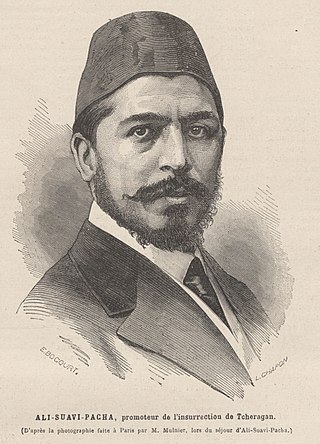Top Qs
Timeline
Chat
Perspective
Ali Suavi
Ottoman journalist (1839–1878) From Wikipedia, the free encyclopedia
Remove ads
Ali Suavi (Ottoman Turkish: علی سعاوی; 8 December 1839 – 20 May 1878) was an Ottoman Turk political activist, journalist, educator, theologian and reformer. He was exiled to Kastamonu because of his writings against Ottoman Sultan Abdülaziz. He is one of the first Pan-Turkists in the Ottoman period.[1][2]
This article needs additional citations for verification. (March 2018) |
Remove ads
Biography
Summarize
Perspective

He taught at an elementary school in Bursa, preached at the Sehzade Mosque in Istanbul, wrote for Filip (Philip) Efendi’s newspaper Muhbir, and worked in different positions at offices in Simav, Plovdiv, and Sofia. He was a member of the Young Ottomans and editor of its official journal. He was also one of the contributors of pan-Islamist newspaper Basiret.[3]
In 1867 he escaped prosecution by fleeing to Paris along with fellow Young Ottomans Namık Kemal and Ziya Pasha, where he stayed until Abdülaziz was dethroned in 1876.[4] With his background in journalism, Suavi was placed in charge of the first Young Ottoman publication to appear in Europe, Muhbir. The newspaper eventually became an embarrassment to the Young Ottomans, who soon thereafter requested that Suavi remove the Young Ottoman association with the publication. Suavi drifted around to various cities in Europe and grew bitter against the Young Ottomans, continuing to publish in other venues, including a newspaper named "Ulûm Gazetesi" (Journal of Sciences) he wrote, edited, and published himself.[5] He lambasted both the republican Young Ottomans and the monarchist Ottoman Sultan's government alike as enemies of the people. Despite his opposition to the contemporary Sultan's government, Suavi's writings showed great respect to the institution of the Sultan, which in his belief would best be filled, for the common good of the people, by an enlightened absolutist.
After the conservative Abdul Hamid II became sultan, Suavi attempted a coup in 1878 known as the Çırağan incident in an attempt to end the increasing authoritarianism and reinstall Murad V, who had been sympathetic to liberal ideals. The coup failed and Ali Suavi was killed in the attempt. According to "İngiliz" ("English") Said Pasha,[6] moments before his death, Ali Suavi took Murad's arm and said to him, "O our Lord, come, deliver us from the Muscovites." ("Aman efendimiz, gel bizi Moskoflardan ḫalâṣ et.")[7]
Remove ads
Publications
- A Propos de L'Herzegovine (Regarding Herzegovina, Paris, 1876)
- Ali Paşa'nın Siyaseti (The Politics of Ali Paşa, 1908)
- Defter-i Âmâl-i Ali Paşa (Defter-i Amal-i* of Ali Paşa, Paris, ?)
- Devlet Yüz On Altı Buçuk Milyon Borçtan Kurtuluyor (The Government Gets Out of a One Hundred and *Sixteen and a Half Million Debt, Paris, 1875)
- Hive (Hive, Paris 1874, İstanbul 1910)
- Hukuku'ş-Şevari (Ways of the Law, translation from Gazali, 1808)
- Montenegro (Montenegro, Paris, 1876)
- Nesayih-i Ebu Hanife Kamusu'l Ulûm Vel Maârif (Nesayih-i Ebu Hanife, Dictionary of Science and *Education, an unfinished essay of encyclopedia, 1870)
- Saydu'l Mefkûd (The Lost Prey, 2 volumes)
- Taharriyat-ı Suavi alâ Tarih-i Türk (The Research of Suavi on Turkish History)
- Usul-i Fıkıh Nam Risalenin Tercümesi (Translation of the Pamphlet named Methodology of the Canon Law, London, 1868)
Remove ads
Further reading
- Johnson, Aaron S. (June 2012). "A Revolutionary Young Ottoman" (PDF).
{{cite journal}}: Cite journal requires|journal=(help) - PhD thesis at the Institute of Islamic Studies, McGill University - Profile
References
Further reading
Wikiwand - on
Seamless Wikipedia browsing. On steroids.
Remove ads

